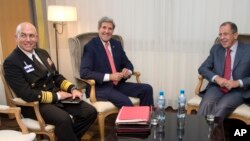The flow of foreign fighters traveling from Latin America to join Islamic State forces in the Middle East has been “significantly curtailed,” a top U.S. admiral said Tuesday.
Navy Admiral Kurt Tidd, the commander of U.S. Southern Command, which oversees American military activities in Central America, South America and the Caribbean, told reporters that the outflow of foreign fighters had diminished because of “significant success in Iraq and Syria” by the U.S.-led coalition.
The admiral came to the Pentagon this week to take part in an international conference, hosted by General Joe Dunford, that looked at the global security landscape after Islamic State is driven out of Mosul, its most populated stronghold in Iraq.
The goal of the conference, Tidd said, was to make sure IS doesn’t “squeeze out” of Iraq and Syria and go to other places.
“It literally was to put in place a global network to be able to be mindful, watchful,” he said.
In March, the admiral had told reporters that the total number of foreign fighters traveling to IS-controlled territory from Latin America was about 100 to 150. He did not provide reporters with an updated number Tuesday.
The curtailed flow of foreign fighters has not necessarily led to a reduction of threats of Islamic State attacks.
IS has been advocating in recent months for recruits to conduct attacks in their homelands if they are unable to travel to the Middle East.
Tidd said that many U.S. partners in Latin America now recognize that attacks by self-radicalized individuals can pop up almost anywhere and with little warning.
“I don’t think it’s safe for anybody to now say, 'Well, it will never happen here,' " Tidd told reporters. “It’s a phenomenon that we’re just going to have to wrestle with.”




